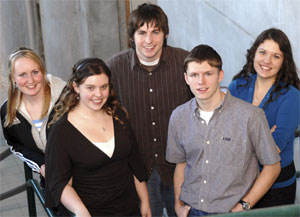| ||
|
When Nova Scotia Power (NSP) customers asked for new ways to save money and help the environment, NSP came to Ľ∆…ę÷Ī≤• seeking answers.
Its Battle of the Bright Ideas contest challenged engineering, architecture and planning students with the question: How can homeowners reduce their energy use?
‚ÄúThe students submitted concrete ideas that illustrate how small changes make a difference and a good place to start is in the home,‚ÄĚ says Alan Richardson, NSP‚Äôs Vice-president, customer service.
Four judges scored all submissions on five elements: originality and innovation; feasibility; energy-savings potential; cost effectiveness; and quality, approach and clarity of the concept plan. Winning entries received a total of $4,000 in scholarships.
Drain water heat recovery
The first prize of $2,000 went to Nathan Steeghs, a third-year mechanical engineering student, for his idea, drainwater heat recovery. Heat from hot water on its way down the drain transfers to cold water as it enters the home.
Preheating incoming water greatly reduces the amount of energy an electric water heater uses to bring the water to the desired temperature. For example, water passing through the drain at 40√ĽC is capable of raising the temperature of incoming cold water from 6√ĽC to 27√ĽC.
‚ÄúAfter graduation I plan to work in the field of energy and emissions trading,‚ÄĚ says Mr. Steeghs. ‚ÄúThere, my engineering can be used to provide solutions to energy-related problems.‚ÄĚ
Phantom load reduction
The second prize of $1,000 was won by Kelli McGean and Kaitlyn McNutt. Both are in their third year of chemical engineering studies.
The phantom load reduction idea focuses on alleviating a little known source of residential power usage, dubbed ‚Äúphantom load.‚ÄĚ This is power used by continuously plugged in electronic devices.
The students recommended the use of an energy efficient universal remote. Used along with a power bar, it allows the homeowner to remotely switch off the power to the bar, making it easy to completely power down their systems ‚Äď and save energy.
‚ÄúMy co-op work term at the Eco-Efficiency Centre was useful in helping us to formulate this idea,‚ÄĚ says Ms. McGean.
Third place
Two ideas were tied for third prize of $500.  Benjamin Breen, a third-year mechanical engineering student, designed an automated computer power management application. When installed on a customer’s personal computer, it will automatically program the machine to run more cost effectively.
PCs come equipped with a form of this program. ‚ÄúBut it‚Äôs rarely activated by the user,‚ÄĚ says Mr. Breen. ‚ÄúAnd the default settings are set very low.‚Ä̬† This application would work with the computer to automate its power use to maximize energy savings.
Mike MacMillan and Laura Payne, second-year engineering students, redesigned the NSP customer bills.
‚ÄúThe new format educates and increases consumers‚Äô awareness about their own energy consumption,‚ÄĚ says Ms. Payne. ‚ÄúCharts illustrate household greenhouse gas emissions and energy usage, allowing customers to visually track their environmental impact. There are also tips and tricks to help them transition into a conservation lifestyle.‚ÄĚ
‚ÄúOur students are tremendous problem solvers,‚ÄĚ says Joshua Leon, dean of the Faculty of Engineering. ‚ÄúWe appreciate Nova Scotia Power for giving these students the opportunity to get their ideas into the public eye. These projects could make a real difference for Nova Scotians.‚ÄĚ


